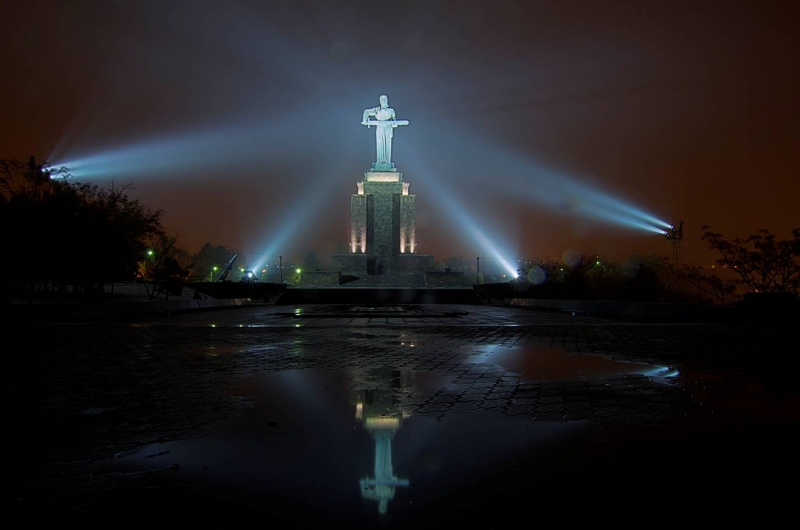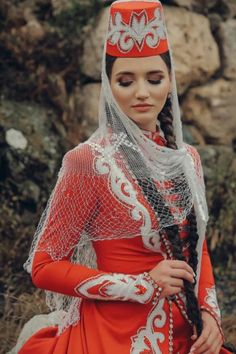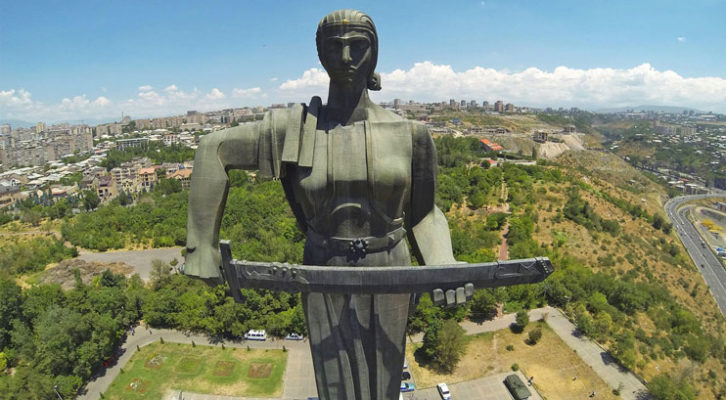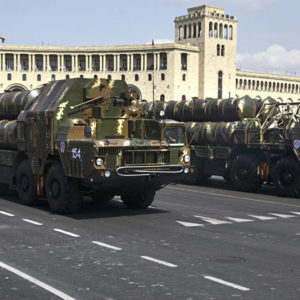Between subjugation and restricting the liberty of the woman on one hand and excessive emancipation of the woman with nostalgia for romance and for family life on the other, the woman as symbol of fertility, medium of creativity and productivity, icon of beauty and passion and not least the guardian of family is still relevant in Armenia.
During the author’s second visit to Motherland Armenia, observing anew with open heart and mind albeit detached from emotions and partiality, a country in transition where the remnants of the open prison, which though provided minimum basic needs, however, uprooted ideological diversity with its lethal repercussions on human comportments, still can be detected. Yet hope and optimism was a companion throughout the visit motivated and inspired mainly by the emblem of progress and continuity embodied in the Armenian woman.
The far, the near and the current history of Armenia best testify the strong and dynamic role of the Armenian women. From glorifying Saint Virgin Mary, going through all the female related symbols identified and carved in historical sites, cultural figures, e.g. 8th century musician Khostrovidukth of Goghtn, novelist Srpouhi Dussap (1840-1901), political activist and poet Silvia Kaputikyan (1919-2006), soprano Hasmik Papian (1961) to name but the very few, to former young Minister of Justice Arpine Hovhanesyan, one of the present Vice Presidents of the Armenian Parliament, and current Minister of Diaspora Dr. Hranush Hakobyan. With incessant perseverance, Dr. Hakobyan, whose professional generosity was overwhelming during two meetings with the author, is determined not to miss an opportunity to bring together the Armenian Diaspora and the Motherland Armenia to serve best Armenia’s national interests. Dr. Hakobyan is the longest-serving member in the Armenian Parliament where 19 out of 105 parliamentary members are women moving from only 3% in 2001 and 10.7% in 2015 to 18.1% in the aftermath of April 2, 2017, parliamentary elections. Although today the Armenian Cabinet is represented only by one female Minister. Nonetheless with the Armenian woman strongly present in the judiciary and legislative authorities, enhancing social, health and educational services and active as private entrepreneurs despite all the accompanying challenges, women in Armenia are slowly however surely contributing in self- realization and giving birth to Great Armenia.
Today and despite limited resources, elegance in all its forms never departs the Armenian woman; whether a public servant, a musician, a guide in a winery or museum, a cashier in a mall or supermarket or a lady making sure a restaurant is shining clean and attractive for visitors. Elegantly dressed and with such pride and dignity, the woman in Armenia gracefully goes to her destination every morning whether to study, to work or to attend to the needs of a family member.
Meeting a considerable number of Armenian women in Vernissage market and elsewhere in Yerevan exhibiting their delicate, sophisticated and obviously, time-consuming handcrafts is both impressive and a strong indicator of women’s engagement in self-employment being high in Armenia.
Being an observer is not enough. Getting acquainted with very distinguished Armenian women who shared the author with their factual insight of the woman in Armenia is indeed a very rich complementing element bridging observation and actuality.
As a member of an Armenian family in the Diaspora, who twelve years ago opted to leave the facile life in USA and move to Armenia out of conviction return of Armenians to Motherland will rebuild Armenia, Angela Hassassian, a young ambitious Armenian woman specialist in communications, stated the following
Women in Armenia are due for some eye-opening, as in reality, they are strong members of the society, both as a backbone for the family and as major contributors in the workforce. Often times, however, their roles are either belittled or completely unacknowledged as the patriarchy is so deep settled into the minds of both men and women alike, that even women themselves tend not to recognize their worth. While they wear many hats filling the roles of mothers, wives, caregivers, breadwinners, experts in their fields etc., they limit themselves when in the presence of men, and accept social restrictions placed on them as simply being natural and expected. And yet I can’t help but feel that women in Armenia are some of the strongest and most admirable that I have ever come to know, and it’s simply a question of having them finally valuing themselves as individuals and as part of the whole society.
The disproportional gender component of the society in Armenia, which is mainly due to male emigrants seeking work abroad, resulted in a much-debated phenomenon especially in recent years and preoccupied young and older women in Armenia while acknowledging past and present strong status of the woman in Armenia despite some accompanying negative social norms.

Mother Armenia Monument, Yerevan
With the typical classiness of the woman in Armenia combined with profound knowledge of Armenian history and literature, our tour guide Hayarpi Ohanyan supported what some claim of ancient Armenian culture being women-friendly by drawing attention to the fact that:
Nowadays the heart of Armenia, Yerevan, is guarded by a woman, the statue of Mother Armenia*. That may be the reason behind the growing power of women in Armenia today. Even though selective abortion is a serious issue in Armenia, the role of women cannot be eliminated in many fields. When I speak about this topic I always remember one woman who was digging all the wells of her village because young men in that community were abroad. The situation of women is very different in this society. In rural places, women are somehow deprived of their femininity because they have to do physical job traditionally prescribed to men. In cities, especially in Yerevan, they are acting successfully in political, social, business and other fields. I hope that in near future we will have no abortion defined by sex or domestic violence. As Armenians like to refer to their historical past, I would like to remind them how they were once treating the women. Next, to the male deities, they worshipped goddesses, Anahit, Astghik and Naneh, whose names are still very popular female names. A few numbers of churches were dedicated to women in early Christian times, moreover, the most “patriarchal” church of Armenia, Mother See of Holy Etchmiadzin, the first officially constructed church of Armenia, was named after Saint Mary and has a bass relief of the first female disciple on one of its walls. Few people know Diana Abgar (Angarian, 1859-1937) who was the first Armenian ambassador ever, appointed to Japan in 1918 during the First Armenian Republic and one of the first female diplomats in the world.
With a background in the Middle East and USA, Diana Abassian, a mother of two young Armenians, who combines teaching English as a foreign language, much-needed profession in a country heading towards integration in Europe and reaching the world, and attending to familial needs, underlined the following
If I had to compare women in Armenia to women in the West, I would say they are more hardworking, whether outdoors or at home. They are more dedicated to the family and they tend to baby their children regardless of their age. Armenian women are treated inferior to men. For example, the daughter is expected to help in the household chores, cooking, serving everyone around them while their brother and father would sit around and expect to be served. Paradoxically, sex-selective abortions are a big problem in the country which considers having a son preferable to having a daughter. Though we are seeing some improvement in the newer generation, it is still a slow process. In addition, you would see more Armenian young women than men in the country, for Armenian men leave the country in search for work while Armenian women are forced to raise the family single-handedly.
While Nelly Manukyan, a highly gifted professional flute and piano player who comes from a family of musicians, including a composer and organ player brother Hovhannes Manukyan, shared her profound and optimistic thoughts of the woman in Armenia and stated
I am proud to be Armenian. In traditional families, the Armenian woman has always been the strong foundation and the pillar of the family both for her husband and children. I am glad in our time the Armenian woman is able to combine family responsibilities with her work and excel as a businesswoman i.e. realizes herself. I wish each woman in Armenia was self-sufficient: taking care of her beauty and health, two essentials and not luxury, as it is the case in the developed countries, where during my visits I noticed women seem to be less emotionally and physically drained than Armenian women. May the intrinsic attributes of pride, loyalty and loving nature of the Armenian women survive all challenges.
Anahid Nazaryan, a young, nation-loving, ambitious Armenian woman, co-founder of and project manager at Sahman non-governmental organization engaged in community development in border villages of Armenia together with other two young Armenian women, reflected her somehow pessimistic insight without abandoning hope in Armenian women by underlining that
Armenian women are always praised for their high morals, love, and care for family and children. But few ask what generates these attributes. In most Armenian families and since early childhood, girls are brought up and educated as future wives and mothers. Hence it is normal for most girls to dedicate their lives for the family. Often women just reproduce and reflect their family unwittingly without valuing themselves as human beings. Armenian women have very low self-esteem due to lack of realizing the importance of life and because of family boundaries. Despite these negative social norms, women in Armenia have more opportunities for the growth of their personal and professional lives and unlike the men, they have fewer responsibilities during their early lives. In this difficult financial and political period in Armenia, men are still in charge of the financial problems of the family and shoulder its responsibilities. Therefore many men tend to start working at an early age often missing education and self-realization. Hence, it is easier for women to get a good education and better positions in the professional arena which remain missed opportunities by many women in Armenia. Nevertheless, more and more women are seizing these opportunities and trying to make changes in Armenia with the painful reality of those women thinking and living outside the box not receiving the support if not the rejection of the society overlooking productive women can equally if not more effectively generate love and care for their families and children.
With advantaged if not luxurious centres in Europe in mind, far from Yerevan in an area with very limited facilities, the author met Hasmik Hovhannissyan, cofounder and president of Centaur Animal-Assisted Therapy Centre that helps stray and neglected animals recover from their health issues and then they help people get over their mental and physical problems. A centre that deserves all possible support by the local and international relevant bodies. Hasmik’s care for the most vulnerable segment of the Armenian society together with another very young dedicated Armenian woman is combined with her concern for Armenian woman’s needs while acknowledging the unique implicit diplomacy of the Armenian woman as follows
In a nutshell, the primary concern of the Armenian woman is her family – the husband and the children. This has its pros and cons. For instance, the Armenian woman’s children and husband are always well-fed and well-taken care after and her house is always clean and shining but her own needs and wishes are almost never a priority for her. An Armenian woman is soft, but strong, in seemingly patriarchal society there is in reality matriarchate but an Armenian woman is wise enough not to show it openly but direct her husband and the family course softly.
Whereas Lilit Kirdikanyan, like any typical Armenian woman embracing professionalism without compromising her feminism, a Chemist by education and Front Desk Manager at Republica Hotel, underlined the evolving character of the Armenian woman and told the author
Nowadays, women in Armenia are very different from those of the older generation. This is due mainly to women in Armenia receiving education not only at home but also abroad. Hence they become more independent and know and appreciate their true value. They no longer tolerate insult from men and have all the courage to express their opinion, however without losing their femininity and preserve the ideal example of the mother tendance.

While the evolving role of the woman in Armenia is best represented in the education, task and in the perception of Mary Manukyan, specialized in Political Management/Analysis and Assistant to the Minister of Diaspora, who presented the following concise holistic description of the woman in Armenia.
Traditionally, women always had a significant role in the Armenian society in general and in the Armenian families in particular. At the present, the woman is still considered the pillar of the family while preserving a significant presence in the political arena and public life of Armenia, which is best testified with one of the first female ambassadors in the world being but the Armenian Ambassador Diana Abgar.
In the light of the aforementioned, the Armenian society combines both patriarchal and matriarchal features which hopefully will evolve towards a balanced and humane society promoting the rights of all and learning lessons from both conservative and liberal societies who are far from enjoying true harmony and serenity.
In addition to the urgency of bridging the gender wage gap and providing equal opportunities in education and employment, the realities pertinent to the woman in Armenia echoed in the above statements hopefully will be eye-opening and inspiration for all, including scholars and practitioners in Armenia to, in partnership, develop relevant recommendations and policies respectively, further enhancing the status of the woman in Armenia which in its turn will enhance the status of Armenia; country and people. Despite the challenges and social ailments facing the Armenian society as it is the case with all nations in transition. The woman in Armenia will remain a source of hope, integrity, and continuity.
———————————
*In spring 1962, the statue of Stalin was removed and replaced by the Mother Armenia statue, designed by Ara Harutyunyan. The Mother Armenia statue symbolizes peace through strength.
References:
1- World Bank (2016), Armenia Country Gender Assessment.
2- Wikipedia, Women in Armenia.
After assuming several responsibilities including the Executive Director/ Editor of the English edition at Arab Alyawm and acting as an academic advisor for Swedish post-graduate students and researchers from political and economic disciplines engaged in the Middle East relevant topic. Madeleine Mezagopian acts as an advisor, analyst, and researcher tackling topics on peace and socio-economic and political development pertinent Jordan and the region. Throughout her career, Madeleine authored and coauthored several papers and articles i.e. Holistic Approach to Globalization and its Impact on Poverty in Jordan (2001), “Jordan’s Diplomacy of Peace and Human Security” in Jordan: Arab Diplomacy in the World (2013), ” From the Homeland Jordan to Much Yearned for Motherland Armenia,” Armenian Weekly (2016), ”The EU and Jordan: Aligning Discourse and Practice on Democracy Promotion” European Foreign Affairs Review, Volume 22 (2017).







